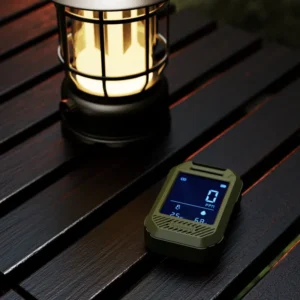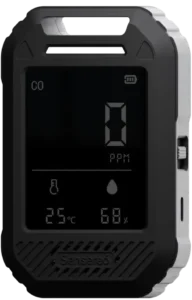Brief Summary:
This article emphasizes the importance of carrying a portable carbon monoxide (CO) detector while traveling with family. It highlights the hidden risks of carbon monoxide exposure in various accommodations like Airbnbs and hotels, which may lack sufficient CO safety measures. Readers will learn practical tips to stay safe both indoors and outdoors from hotels to RVs and campsites and discover how portable CO detectors like Sensereo’s Bastion-1 can protect your family wherever your adventures take you.

The Hidden Dangers of Carbon Monoxide While Traveling
Have you ever wondered what might be lurking in that cozy hotel room or charming Airbnb? Carbon monoxide (CO) is a colorless, odorless gas so sneaky that it’s often called the silent killer. It’s created when fuels like gasoline, propane, or wood burn incompletely, and exposure can lead to serious health risks even on a short family getaway.
Unfortunately, not every accommodation is equipped with a working travel carbon monoxide detector. That means you and your loved ones could be at risk, especially in winter months when heaters work overtime. Gas appliances, vehicles left running in garages, and even portable generators can all emit CO. Since we can’t see or smell it, vigilance is key when traveling. My family and I always double-check our lodgings for safety, but we’ve learned it’s better to carry our own portable CO detector to be sure.
Many people think CO exposure only happens indoors, but outdoor adventures can pose hidden risks too. If you’re camping near running vehicles, using a charcoal grill inside a tent canopy, or spending the night in a van, carbon monoxide can build up faster than you think. It’s a reminder that CO safety matters wherever you sleep not just in hotels.
Why You Need a Portable Carbon Monoxide Detector
It’s no exaggeration to say that a portable CO detector is a must-have on every family travel checklist. Why? Because while you might assume your Airbnb, hotel, or camper is safe, many places simply aren’t equipped with a battery operated carbon monoxide detector or maybe the device is old, broken, or missing batteries.
I love how portable these CO detectors are. Most models weigh less than a smartphone and are easy to slip into your luggage. There’s no complicated setup required: simply place your travel carbon monoxide detector in your sleeping area and let it do its job. For campers or RVs, a battery operated carbon monoxide detector is especially important, since enclosed spaces can fill up with CO quickly if an appliance malfunctions.
Another feature I value is battery efficiency. Many detectors offer sealed lithium batteries. Imagine not having to worry each time you pack just grab your device and go! Some even double as a USB carbon monoxide detector for easy charging on the road.
Bringing your own CO detector gives you peace of mind. I’ve slept better on trips knowing that even in unfamiliar places, my family is protected from a risk we can’t see or smell.
Key Features of a Reliable Portable CO Detector
- Long battery life: Whether you go for a battery operated carbon monoxide detector with AA batteries or a sealed lithium cell, pick one that lasts through multiple trips.
- Compact and lightweight: Size matters when space is limited. Reliable detectors are small enough to slip into a pocket, fanny pack, or camper storage.
- Loud audible alarm: Look for models with sirens at 70 dB or higher, so you won’t miss a warning no matter how deeply everyone’s sleeping.
- Clear visual indicators: Some detectors include LED lights or digital screens, so you can glance at CO levels or battery status even in dim corners.
- Accurate sensors: Trustworthy travel carbon monoxide detectors use electrochemical sensors for fewer false alarms and reliable readings every time.
We recently tested the Sensereo Bastion-1 portable CO detector on a family road trip. Not only did it provide peace of mind, but its small design only 100 grams meant we can take it anywhere without hassle. What’s more With a built-in rechargeable lithium battery, it can last up to 20 days on a single charge. These features make Sensereo Bastion-1 ideal not just for hotel stays, but for camping, hiking lodges, and road trips anywhere clean air isn’t guaranteed and always enable you to enjoy continuous protection wherever you go.

Checklist for Family Travel Safety
Want an extra layer of travel confidence? Here’s my go-to family travel checklist for staying safe on the road:
- Check accommodations: Before booking, ask the host or hotel if they have working carbon monoxide and smoke alarms installed.
- Portable devices: Bring your own portable CO detector and test it before you travel.
- Vehicle safety: Inspect your car, camper, or RV for leaks or exhaust issues. Use a camper CO detector if you’re camping or using a motorhome.
- Plan for emergencies: Everyone should know two exits and a meeting spot in case of an emergency evacuation.
- Medical info: Pack copies of important medical documents and make sure everyone knows allergy or medication needs.
- Communication: Agree on how to contact each other if you get separated on an outing.
It’s easy to forget small safety steps in the excitement of travel. A solid checklist ensures you’re not just making memories. You’re protecting what matters most.
Outdoor CO Safety Tips for Campers and RV Travelers
Even in open-air environments, CO buildup can occur around fuel-burning appliances. Keep these in mind during your next trip:
- Avoid cooking inside enclosed tents or vehicles. Always use grills and stoves outdoors.
- Position your portable CO detector near sleeping areas. Devices like the Sensereo Bastion-1 can be hung or placed on a flat surface to monitor air quality through the night.
- Keep vents clear. Check that exhaust pipes on RVs or generators aren’t blocked by snow, leaves, or gear.
- Charge smartly. The Bastion-1 can recharge via USB, making it travel-friendly even for long camping trips without direct power.
- Recognizing Carbon Monoxide Poisoning Symptoms
CO poisoning can catch anyone off-guard even the most prepared traveler. It’s especially tricky because early signs can look just like a case of the flu, but without a fever.
- Headaches:Often the very first symptom.
- Dizziness or weakness:Feeling light-headed or unusually tired should always raise a red flag if you’re inside.
- Nausea or vomiting:Stomach upsets that don’t seem food-related could be caused by CO.
- Confusion:Difficulty thinking or acting normally, sometimes as a late warning.
If any of your family starts feeling these symptoms while indoors, don’t second-guess. Get everyone outside into fresh air immediately, then call for medical help. CO poisoning escalates fast, so it’s always better to be safe than sorry.
Ventilation: A Key Factor in Preventing CO Exposure
Proper ventilation is one of the best defenses against carbon monoxide exposure when you’re away from home. My family has stayed in all sorts of places from old cabins with wood stoves to slick new apartments with gas heaters so we’ve learned to check that everything ventilates properly.
- The Basics of Ventilation:Dilute CO levels:Always keep a window cracked if an appliance is running. Outside air helps prevent CO buildup.
- Use vents and fans: Make sure exhaust fans actually vent outsidenot just into an attic or hallway. In campers, a dedicated camper CO detector can add another level of safety.
- Regular maintenance:Well-maintained appliances are less likely to produce dangerous gases, so have rentals checked regularly if staying long-term.
- Never use fuel-burning devices indoors: That means grilling, barbecuing, or using a generator should always be done outside.
When you combine these steps with a reliable portable CO detector, you’re doing all you can to keep your entire family safe, wherever you travel together.
How to Pack Your Portable CO Detector for Travel
- Choose a compact, battery operated carbon monoxide detector: Small models like the Sensereo Bastion-1 fit easily into a side pocket.
- Verify battery type and charge:Before you leave, make sure your CO detector is fully charged or has fresh batteries. If you’re flying, check TSA rules for carrying devices with lithium or alkaline cells.
- Pack extra batteries:If your detector is not rechargeable, keep an extra set handy to avoid any gaps in protection.
- Test before departure:I always press the test button before packing—just to be sure nothing got bumped or dislodged.
- Store accessibly:Keep your travel carbon monoxide detector where you can grab it fast: in your day bag or a carry-on, not buried at the bottom of a suitcase.
Following these tips ensures your CO protection travels right alongside you no matter the adventure.
Conclusion: Travel Safely with CO Detection
At the end of the day, our best memories come from sharing safe, happy adventures with our loved ones. Packing a portable CO detector is a simple step that could make a life-saving difference. Not every hotel or camper is equipped with a working travel carbon monoxide detector and you can’t rely on luck when it comes to invisible gases.
Stay safe wherever your journey leads from cozy cabins to open campsites.
The Sensereo Bastion-1 combines compact design, rechargeable convenience, and reliable detection, making it your ideal companion for both indoor stays and outdoor adventures. Travel freely, breathe safely.



